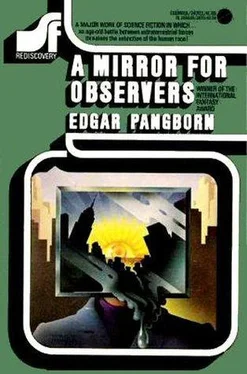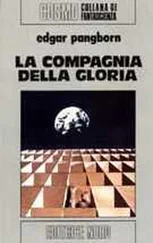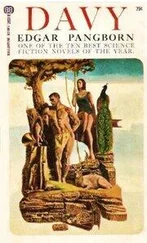“I like their views.”
“You’re going to try to get Angelo away from those neo-nazis?”
“He must get away under his own power.”
“And if he doesn’t?” She studied me with worried tenderness. “What if he’s sold on their stuff and spits in your eye?” Somehow I must make her stop thinking about me.
“He isn’t and wouldn’t. He hasn’t changed that much, not down inside. He’s tied by gratitude to Keller for practical kindnesses — as I don’t doubt Keller meant he should be. Trapped into loyalty toward something that’s foreign to him, a loyalty with roots dangerously deep in childhood. He’s still the boy who admired Billy Kell. Funny: I just remembered watching you and Angelo bury that little pup of his in the back yard. You probably didn’t know I was in my window. You were wrassling a chunk of paving stone — I remember the way your skinny little behind stuck up in the air—”
“Mister! My present dignity!”
“Well, previously you’d been sitting on something dusty, you and your white drawers. Yes, the old things come back.”
“Ah, they come back!” she said. “Or they’ve never gone away.”
“The cloud-capped towers — look at them again, Sharon.”
“Why, we had a country, Ben, one of our own. A year or so before you came to Latimer. It began at a special crack on the sidewalk of Calumet Street, a twisty crack that looked like S and A together….”
“Go on, Sharon.”
“We’d known for a long time that the country was there. And speculated about it. The population was primitive, or say quasi-medieval — mighty high percentage of kings and villainous viziers, afreets all the time monkeying around, heck, you couldn’t hold ’em…. Angelo drew a gorgeous map of the place, so I had to draw one too, only his was better. I had a river going right over a mountain range, he wouldn’t stand for that. It was my river, and I got mad, so” — she pressed light finger tips over her eyelids — “so he said, ‘Well, then it’s a river that goes underground, under the mountains.’ And redrew his own map to accommodate it, worked swell — caverns and subterranean lakes and stuff….”
“There might have been a blue-white light that came from nowhere, and your voices came back to you from the wet rocks.”
“Oh — you’d know! Well, one day we decreed that we’d step over that crack at last in a certain way, and remain in — the name of the country was Goyalantis — remain there as long as we chose. Of course to others it looked as if we were still in this world. A necessary convention. We felt quietly sorry for the poor souls because they’d look at us (and oh! even make us wash and comb our hair and eat oatmeal and not say damn) and they’d think we were with them when heaven knows we weren’t at all. We stayed — in fact I don’t remember any ceremony of coming back. I think we never did bother to come back.” She opened her eyes, and they were swimming. “Your hands haven’t changed. Play for me.”
Small stuff. One of Field’s sentimental nocturnes I happened to remember, because there was a warming night of March beyond the windows. And then the First Prelude of Chopin, as Sharon had taught me it might be played. She was looking down at me, but seeing Goyalantis too, never having left it, and though there were colored mists in Goyalantis, its air could be crystal, a crystal lens for observation of this other world which is not alone in possession of a special seeing we like to call truth. She said: “I wasn’t mistaken.”
“About what, dear?”
“About you. You see, I never believed you were dead. I remember flatly denying it when I was told. I think I went on denying it, though I learned I couldn’t talk about you even to Mother Sophia. I knew all along that the ‘Waldstein,’ at the recital — that it was for you. You know, they didn’t want me to program it — even Mother Sophia didn’t like having it follow the Carr suite. But it had to be there. As I knew three years ago when I started serious toiling over it….” She added, so softly that I barely heard it above an idle chord I had touched: “You want me to see him?”
“Only if you want to.”
“I’m afraid to, Ben.”
“Then let it wait. But he hasn’t left Goyalantis.”
“Do you know that?”
“Almost.”
“But maybe he ought to leave it. It’s good country for me. I live with dream stuff, and now they’re beginning to pay me for it, bless ’em. But for Angelo? You said he was trying for music.”
“Miserably. Fighting it. Like this.” I spoiled a few measures of the Two-Part Invention as Abraham had done. Sharon winced. “Then goes back and plays it again — same way, du lieber Gott!”
“That won’t help,” said Sharon Brand. “Think he’s reaching for what he can’t ever have?”
“Kid with both hands full of cake reaches for a plum and drops the cake. But you could judge of that better than I.”
She laughed, not happily. “You get sort of wicked now and then. Oh, you know I’ll see him — sometime soon. Feminine curiosity.”
“I’ll settle for feminine curiosity.”
I left early, for I learned that Sharon had been working hard that day. An appearance with the Philharmonic, in response to popular demand, had been arranged for April, a first fruit of her triumph. Time to prepare for it was short. She was to give the Franck Symphonic Variations, and told me she still had the thing only three-quarters memorized. Wasn’t worried about it either — brr!
The door of my apartment was locked. But I had left it off the latch, on the chance that Abraham might come while I was away — sneering at myself for such a hope but compelled to act on it. Now I had trouble with the key.
The light was off when I opened the door and glimpsed the coal of his cigarette. He knocked a lamp over by groping, laughed helplessly as I found the wall switch. “Graceful,” he said, and lost his cigarette trying to retrieve the lamp. We got straightened around. He was glad to see me, ashamed, scared. He said: “The c-cat came back. Kind of singed.”
“Did you think I was sore?”
“You had a right to be.”
“Nah. Hold everything.” I mixed him my Double Grenade: three fingers brandy to one of applejack. Nobody can like it, but if you already feel ghastly, it likes you. Abraham gasped and commented: “Why’d they bother to split the atom?”
“Go another?”
“Soon as I get the burnt meat out of my throat, not right away….”
“I read about Walker in the paper.”
He shuddered, not at the drink. “What’re they saying?”
“They quote Max: nervous breakdown from overwork.”
“And that’s all?”
“His speech was incoherent, it says here.”
“It wasn’t, Ben. I was there.”
“Will — Will Meisel. Get used to it. Could be important.”
“I’m sorry. I’ll try. I’ve thought of you the other way.”
I built a milder drink. “Take this one slow. It’s supposed to glaze over the charred spots.” He was looking at horror, and words wouldn’t come. But his young face was not, as it had been this morning, a battleground. It was the face of a sleeper beginning to wake — to a most ugly day, but at least waking. “Abe, suppose I run through what I know or guess. You catch me up if I have any facts wrong.” He nodded gratefully. “Daniel Walker is — was — a man for big emotional conversions. He couldn’t just step out of the Organic Unity Party. If he fell out of love with it he’d have to hate it, probably with a phase of hating the whole world and everyone in it. Call him manic-depressive, for a label. No middle ground: all black and white for Daniel Walker. I was at the Party office twice yesterday. Walker slipped up, told me something that was out of favor, already obsolete when I went back in the afternoon. Keller jumped on him for it. Walker’s mind flopped over on its other side. Much faithful service and then a kick in the teeth—”
Читать дальше












